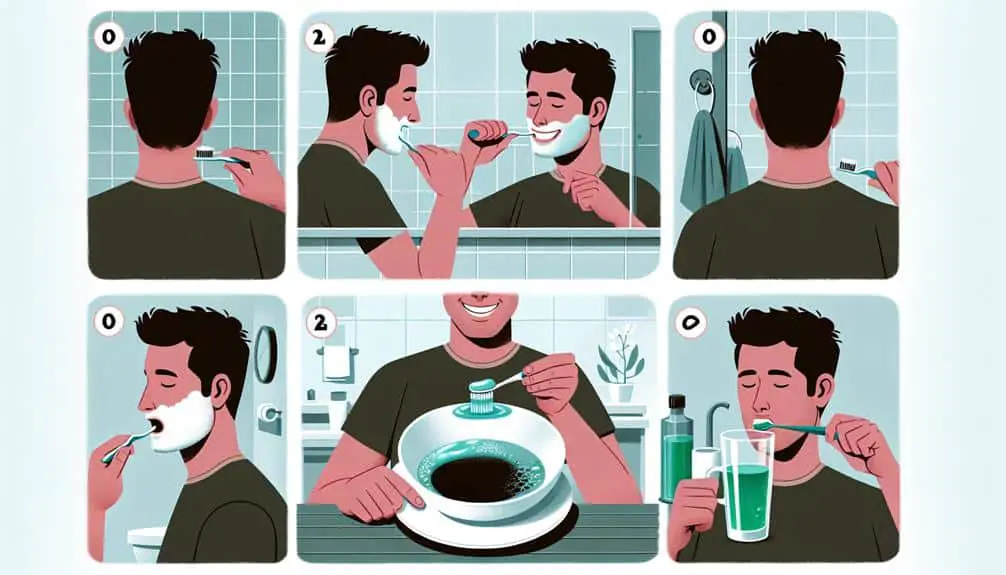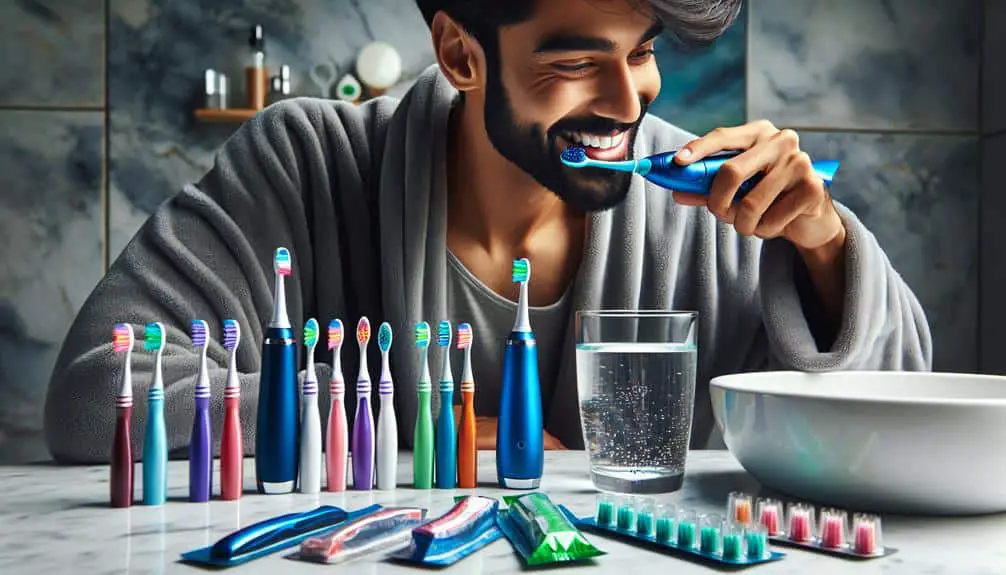To maintain the radiance of your whitened teeth, focus on avoiding staining agents by choosing teeth-friendly snacks and using a straw for staining beverages. Make sure to schedule regular dental check-ups to catch any issues early and reinforce good oral hygiene habits. Practice proper brushing techniques by using a soft-bristled toothbrush at a 45-degree angle, and consider using whitening toothpaste consistently. Remember, these habits can go a long way in preserving your bright smile.
Key Points
- Avoid staining agents like coffee and red wine
- Maintain regular dental check-ups for professional cleaning
- Use proper brushing technique with a soft-bristled toothbrush
- Limit consumption of staining beverages and use a straw
- Incorporate whitening toothpaste into daily oral care routine
Avoid Staining Agents
To maintain the shine of your whitened teeth, it's essential to steer clear of staining agents in your daily habits. One important way to do this is by opting for teeth-friendly snacks. Instead of indulging in sugary treats or highly pigmented foods that can stain your teeth, consider choices like crunchy fruits and vegetables, cheese, or nuts. These snacks not only satisfy your cravings but also help promote saliva production, which aids in washing away food particles that could potentially cause staining.
Moreover, making lifestyle changes can greatly impact the longevity of your whitened teeth. Drinking beverages like coffee, tea, and red wine through a straw can minimize direct contact with your teeth, reducing the risk of staining. Quitting smoking is another vital lifestyle change that not only benefits your overall health but also helps in maintaining the whiteness of your teeth. By being mindful of the staining agents you expose your teeth to and making thoughtful choices, you can preserve the shine of your whitened teeth for longer periods.
Regular Dental Check-ups
Regular dental check-ups play an essential role in maintaining the health and brightness of your teeth. These routine visits to your dentist are vital for detecting any potential issues early on, such as cavities or gum disease, which can affect the appearance of your teeth. During these visits, your dentist can also provide professional cleaning to remove plaque and tartar buildup, helping to keep your teeth looking their best.
In addition to the cleaning aspect, dental check-ups offer valuable opportunities for discussing and reinforcing good oral hygiene habits. Your dentist can advise you on proper flossing techniques and the importance of flossing daily to remove plaque from areas that your toothbrush may not reach effectively. Moreover, they can recommend products for enamel protection, such as fluoride toothpaste or mouthwash, which can help strengthen your teeth and prevent decay.
Proper Brushing Technique
Maintaining a proper brushing technique is essential for preserving the shine and health of your whitened teeth. To effectively brush your teeth, use a soft-bristled toothbrush and fluoride toothpaste. Hold the brush at a 45-degree angle to your gums and brush gently in circular motions. Make sure you cover all surfaces of your teeth, including the outer, inner, and chewing surfaces. Don't forget to brush your tongue to remove bacteria and keep your breath fresh.
In addition to brushing, effective flossing is important for preventing plaque buildup between teeth. Use about 18 inches of floss, gently glide it between your teeth, and curve it against the side of each tooth to remove debris. Make sure to use a clean section of floss for each tooth to avoid transferring bacteria.
Incorporating a mouthwash into your oral hygiene routine can also bring added benefits. Mouthwash can help reduce plaque, prevent gingivitis, and freshen your breath. Choose a mouthwash that contains fluoride for extra protection against cavities. By mastering these techniques, you can maintain the shine and health of your whitened teeth.
Limit Staining Beverages
Limit your consumption of staining beverages to maintain the shine of your whitened teeth. Beverages such as coffee, tea, red wine, and dark sodas contain chromogens that can lead to teeth discoloration over time. While completely avoiding these drinks may be challenging, moderating your intake can greatly help in preserving the whiteness of your teeth. Additionally, using a straw when consuming staining beverages can minimize their contact with your teeth, reducing the risk of discoloration.
A vital diet plays an important role in not just your overall health but also the appearance of your teeth. Foods high in sugar and acids can contribute to tooth staining and enamel erosion. Opt for a balanced diet rich in fruits, vegetables, and calcium-rich foods to promote strong teeth and gums. Remember to maintain good oral hygiene practices such as brushing your teeth twice a day, flossing regularly, and visiting your dentist for routine check-ups. By combining a healthy diet with proper oral hygiene, you can help protect the shine of your whitened teeth.
Use Whitening Toothpaste
Consider integrating a whitening toothpaste into your oral care routine to help uphold the shine of your teeth. Whitening toothpaste contains special abrasives or enzymes that work to eliminate surface stains on your teeth. When used in conjunction with good brushing habits and a proper flossing routine, whitening toothpaste can be an effective tool in preserving the brightness of your smile.
To get the most out of your whitening toothpaste, it's crucial to use it consistently as part of your daily oral hygiene routine. Brush your teeth at least twice a day for two minutes each time, ensuring to reach all surfaces of your teeth. Additionally, complementing your brushing routine with daily flossing helps remove plaque and debris from between your teeth, preventing discoloration and maintaining the effectiveness of the whitening toothpaste.
Remember that while whitening toothpaste can help maintain the shine of your teeth, it isn't a substitute for professional whitening treatments. If you're looking to achieve a notably brighter smile, consider consulting your dentist for more advanced whitening options.
Frequently Asked Questions
Are There Any Specific Foods That Can Actually Help Whiten Teeth Naturally?
Eating crunchy fruits like apples can help whiten teeth naturally. The natural abrasiveness can scrub away surface stains. Remember, consistency is key for noticeable results when incorporating natural remedies into your dental care routine.
How Long Does It Typically Take to See Results From Using Whitening Toothpaste?
When using whitening toothpaste, results vary. Typically, expect to see noticeable improvements in teeth whitening progress within a few weeks of consistent use. The time frame can range from a couple of weeks to a few months for significant changes.
Can Certain Medications Affect the Whiteness of Teeth?
Certain medications, especially some prescription drugs, can impact the whiteness of your teeth. Be mindful of how medications may affect your dental health and consult with your dentist if you notice any teeth discoloration.
Is There a Difference in Effectiveness Between Over-The-Counter Whitening Products and Professional Whitening Treatments?
When comparing over-the-counter whitening products to professional treatments, consider cost, long-term effects, side effects, and maintenance requirements. Professional treatments may be more effective long-term but come at a higher cost and require maintenance.
Are There Any Alternative Methods for Whitening Teeth That Are Not Mentioned in the Article?
To maintain your pearly whites, explore DIY remedies and natural alternatives. Enhance your smile with ingredients like baking soda, hydrogen peroxide, and activated charcoal. Remember, a healthy oral hygiene routine is key to preserving your bright smile.




